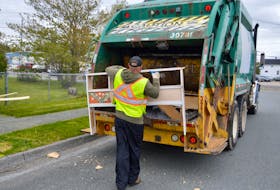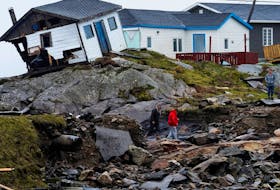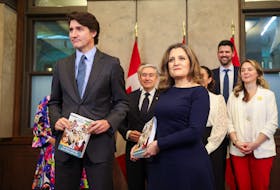OTTAWA — Deputy Conservative leader Candice Bergen criticized the Liberal government’s speech from the throne on Wednesday for failing to acknowledge the role of the oil and gas sector.
The throne speech laid out a variety of broad climate-related plans, including money for home retrofitting, ocean and land protections, and new funding for electric vehicles. The announcements did not include cost estimates.
But Bergen signalled she wanted to see more emphasis on the role of the agriculture, mining, and oil and gas sectors, particularly when depressed oil prices have decimated the economies of some Western provinces.
“It doesn’t speak at all of national unity, it doesn’t speak of our energy sector and our workers in Alberta and Saskatchewan and Manitoba. It doesn’t talk about agriculture,” she said. Bergen dismissed the speech as being “full of Liberal buzzwords and grand gestures with very little to no follow-up plan.”
The Liberal speech did include some passing acknowledgement of Western provinces, saying, “Canada cannot reach net zero [emissions] without the know-how of the energy sector,” or without the innovative ideas of people in British Columbia, Alberta, Saskatchewan and Newfoundland and Labrador.
References in the speech to the fossil fuel sector were exclusively tied to Ottawa’s ambitions to reach net zero greenhouse gas emissions by 2050. It said the federal government would support “energy sectors as they transform to meet a net zero future, creating good-paying and long-lasting jobs,” and would “recognize” farmers, foresters, ranchers as “key partners in the fight against climate change.”
The government said it would “immediately” bring forward a plan to “exceed Canada’s 2030 climate goal,” and legislate its plans to reach net zero emissions by 2050 — a target that has only ever been vocalized by the Trudeau government.
The speech comes as premiers in oil-dependent provinces have called for more recognition of the fossil fuel sector’s contribution to the national economy over the decades, and have called for a greater share of federal transfer funds ever since commodity markets cratered in mid-2015.
Western resentments have been running high, particularly in Alberta and Saskatchewan, following years of failure to build major pipeline projects that have in turn depressed prices for Canadian crude.
The environmental promises laid out in the throne speech were largely in line with suggestions made by the Task Force for a Resilient Recovery, which in recent weeks recommended Ottawa spend $55 billion as part of an ambitious plan to cut emissions and boost renewable sources of energy.
The group included Gerald Butts, former principal secretary to the prime minister, and the former advisers to B.C. Premier John Horgan and Ontario Premier Doug Ford, among others.
The promises include retrofits for homes and buildings (the task force recommended a $27-billion expenditure on retrofits), investments in public transit, and a promise to “make zero-emissions vehicles more affordable” for Canadians.
It said corporate taxes would be slashed in half for companies developing zero-emissions products like electric or hydrogen-powered vehicles, and said it would establish a Clean Power Fund to funnel capital toward cleaner sources of electricity.
It also raised its targets for ocean and land protection, saying it would protect 25 per cent of Canada’s oceans and land by 2025, and 30 per cent by 2030.
Industry groups including the Canadian Chamber of Commerce broadly supported the moves, but many called for more clarity around next steps. The Canadian Council of Innovators, who represents domestic tech firms, said Ottawa needed to lay out firmer plans to protect Canadian intellectual property.
“The government’s commitment to start a new fund to support zero-emissions products is promising, but Canada must ensure that we have a strategy to own more of our clean technology innovations so that we can create economic gains and good jobs here at home.”
Advocacy group West Coast Environmental Law, as well as other climate activist groups, was highly supportive of the federal promises.
“West Coast applauds the government’s renewed commitment to a legislated national goal of net-zero greenhouse gas emissions by 2050, and to exceed the current, inadequate 2030 climate target.”
• Email: [email protected] | Twitter: jesse_snyder
Copyright Postmedia Network Inc., 2020








